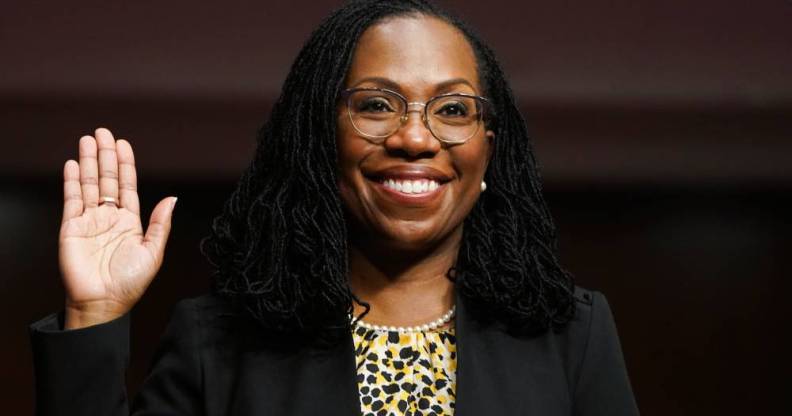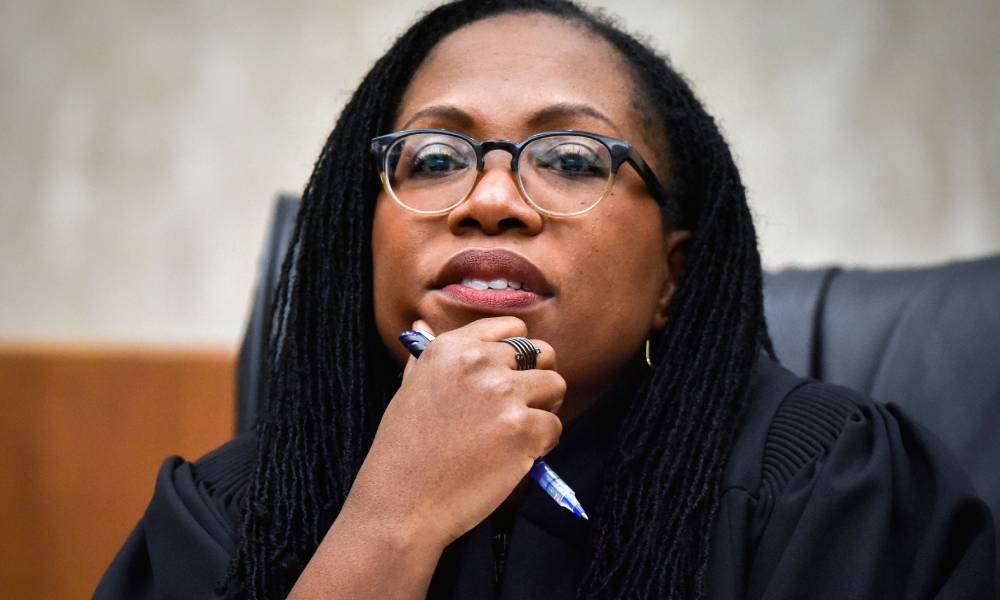LGBT+ groups react as Ketanji Brown Jackson becomes first Black woman nominated to Supreme Court

Ketanji Brown Jackson is sworn in to testify before a Senate Judiciary Committee hearing on pending judicial nominations on 28 April 2021. (Getty/Kevin Lamarque-Pool)
President Joe Biden has nominated judge Ketanji Brown Jackson to the Supreme Court, who would be the first Black woman to sit on the bench.
Jackson, 51, has been nominated to succeed justice Stephen Breyer, who announced his retirement last month. Breyer, 83, is the most senior member of the Supreme Court’s liberal justices following the death of Ruth Bader Ginsburg in 2020.
Jackson is the first Black woman to be nominated to the Supreme Court. Only two Black male justices – Thurgood Marshall and Clarence Thomas – have served on the court so far.
Biden announced he would be nominating Jackson to the role on Friday (25 February) and hoped the Senate would confirm her to the role in a “timely” manner.
“Judge Jackson is an exceptionally qualified nominee as well as an historic nominee, and the Senate should move forward with a fair and timely hearing and confirmation,” he said.
According to the White House website, Jackson was told by her high school guidance counselor to not set her “sights so high” after she said she wanted to attend Harvard. However, she didn’t take that to heart, eventually graduating from both Harvard University and Harvard Law School.
She clerked for two federal judges, including justice Breyer, and worked in private practice. She also served as a federal public defender in Washington DC before she was confirmed as a district court judge in 2013.
In 2021, Jackson was one of president Biden’s first judicial nominees, and she was confirmed to the US Court of Appeals for the DC circuit.
Joni Madison, interim president for the Human Rights Campaign (HRC), said Jackson has “earned a reputation for integrity, professionalism, and unwavering commitment to the Constitution” throughout her career.
“Her tenure on the bench provides ample evidence that she is both prepared and trustworthy of this highest privilege, and responsibility, that comes with sitting on our highest court,” Madison said.
Madison added that Jackson will “continue Justice Breyer’s legacy as a champion of equality”.

Judge Ketanji Brown Jackson listens to arguments as local high school students observe a reenactment of a Supreme Court case at US Court of Appeals in Washington, DC. (Bill O’Leary/The Washington Post via Getty)
At her confirmation hearing in April 2021, Jackson was questioned about her tenure on the board of Montrose Christian School, a now-closed Maryland private school, from 2010 to 2011.
Senator Josh Hawley noted that the school’s statement of faith indicated that “we should speak on behalf of the unborn” and that “marriage is the uniting of one man and one woman”.
In response, Jackson said that she believed in “religious liberty” and that “any personal views about religion would never come into my service as a judge.”
But she said that she had served on several boards across her career and didn’t necessarily agree with “all of the statements that those boards might have in their materials”.
Kevin Jennings, CEO of Lambda Legal, said that Biden has “fulfilled his pledge to elevate a Black woman to the highest court in the land” by tapping Ketanji Brown Jackson for the role.
Jennings said that Lambda Legal had conducted a preliminary review of Jackson’s record, and it had given the legal firm “significant comfort that she can be trusted to administer the fair and impartial justice the country needs”.
“We urge the Senate Judiciary Committee to act thoroughly and promptly in fulfilling their constitutional duty to consider president Biden’s nominee,” Jennings said.
“All of us deserve and must insist upon a Supreme Court whose members are committed to upholding the Constitution, including its sacred guarantees of liberty, equality, and justice for all.”

